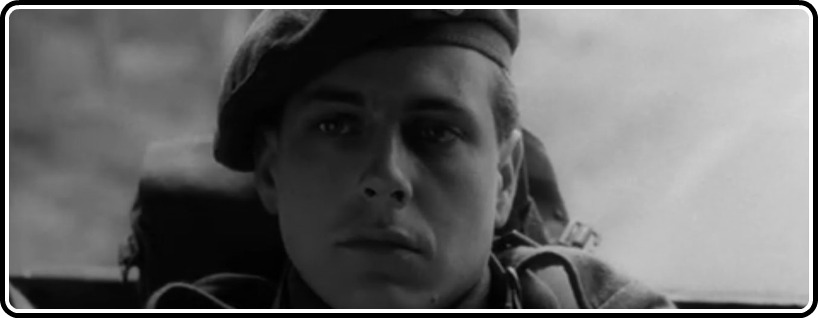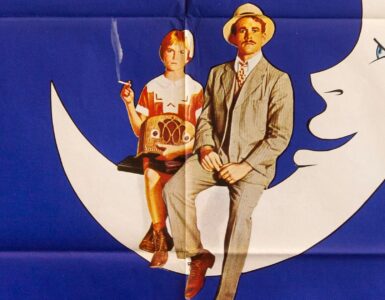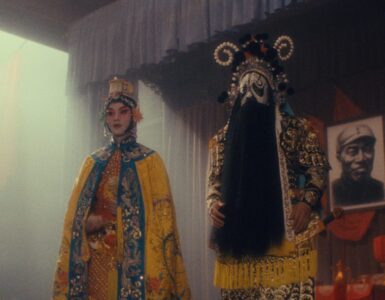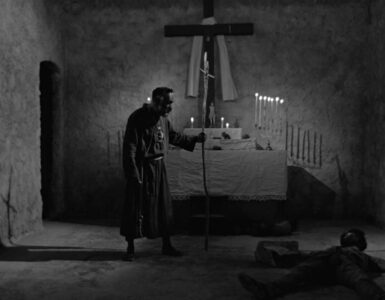Since the dawn of man, there has been war. Whether it be for land or in the name of a religion, war has been waged between men throughout history. It has also been one of the most discussed themes throughout the history of cinema. Be it an unforgettable look at the life of war veterans like The Best Years Of Our Lives or the seemingly millions of films looking at our current battles in Iraq, war has been the topic of some of cinema’s greatest and most affecting triumphs.
And then there are films that defy description. Films that not only get at the true soul war, but do so in such a brazen and aesthetically forward thinking manner that they break out of the realm of cinema and become art by way of sociological artistry. Think Kubrick’s Paths Of Glory, possibly cinema’s greatest anti-war art piece. Think Elem Klimov’s devastatingly unforgettable gut punch Come And See. These are just a pair of films that not only dug deep at the horrors of war, but pushed the medium that is cinema to places it hadn’t been before. And yet, there has never been a film quite like director Stuart Cooper’s seminal 1975 masterpiece, Overlord.
Shot by the aforementioned Stanley Kubrick’s John Alcott, Cooper’s picture is a breathtaking mixture of archival war footage and an entirely fictional story, a meditation on the true horrors of war, and how its as isolating a proposition as humans have ever come up with. The picture introduces us to a young man, nearing his 21st birthday (he turns 21 during the length of the film), as he makes his way from basic training to the film’s conclusion, a fictionalized account of D-Day. The film stars Brian Stirner as Tom, a young man who enlists and goes from bright eyed youngster to a man with about as bleak a world view as one could imagine over the span of this under 90-minute-long masterpiece. Crafted over three decades after the events of D-Day, Cooper’s film is absolutely one of the greatest war films ever made, and is now available on Blu-ray via The Criterion Collection.
The biggest star of this film is the aforementioned director’s work behind the camera. Getting gorgeous photography from Alcott, Cooper’s direction here is experimental and thought provoking. While the use of archival footage is at times a tad clunky, the pure impressionism on screen here during the fictionalized sequences is absolutely unforgettable. Dream like, or more fittingly nightmarish, the film is drenched in a brooding sense of impending doom, a bleak and obsidian black world view postulating that as the war machine grows, the singular soldier becomes more and more isolated, smaller and smaller until he or she becomes the manifestation of nothingness. Be it a devastating voice over reading of a letter written by our lead to his parents, a deeply intense tracking shot through the woods or a sequence between our lead and his new love interest that is shot against an isolating yet bewilderingly romantic pitch-black background, the film never allows the viewer to ever get his or her feet under them. Instead, the film is as much a tone poem about war’s destructively isolating nature as it is anything remotely resembling a feature length narrative feature. Almost Malick-esque in its distilled, philosophical aesthetic, the film is truly unlike anything the film world had seen prior, or honestly has seen since.
Thankfully however, the film is not only utterly raw in its emotional discussion of the horrors of war, but it also features some breathless performances. Starring Stirner, the film gets a top notch lead performance that is so wonderfully toned and all encompassing narratively that it feels like a perfect extension not only of the themes being touched upon here, but of the overall post-WWII angst felt within this part of the world. The final sequences here are so purely and emotionally rendered that for such an experimental picture to have such a devastating heart at its core proves this to be a real winner of a film. Cooper co-wrote the deftly toned screenplay with Christopher Hudson, and thankfully the film has a pitch black sense of humor that really only amps up the overall emotional gusto the film packs behind each punch. Toss in small performances from names like Davyd Harries, Nicholas Ball and Julie Neesam and you have a film that has the emotional core of a great drama and the aesthetic playfullness and anarchy of a Godard picture. Think The Thin Red Line if Hail Mary-era Godard got his grubby paws on the picture.
And now, finally available on Blu-ray, this film is an absolute must own. The transfer here is a breathtaking bit of restoration work, a new transfer supervised by Cooper himself. Cooper and Stirner are featured here on a really great commentary track that is as insightful as it is engaging. There’s a great video piece from 2007 here on the footage used in the film and its relation to the Imperial War Museum in London, and from the same year photographer Robert Capa gets some respect in a video piece from Cooper himself. There’s a short film from Cooper about Spanish artist Juan Genoves, and Stirner is the voice behind the reading of journal entries from two D-Day soldiers here as well. Finally, the British Ministry Of Information is the source of two video pieces, one propaganda film from which footage is taken for the film proper, and finally a tribute to newsreel cameramen from 1943. Rounded out by a dense booklet and some breathtaking cover art, and you have a release that is both powerful and still, to this very day, a haunting meditation on the deep rooted evils within war and the war machine.







![Bergman Island (The Criterion Collection) [Blu-ray]](https://criterioncast.com/wp-content/uploads/2022/11/bergman-island-the-criterion-collection-blu-ray-400x496.jpg)
![This Is Not a Burial, It’s a Resurrection (The Criterion Collection) [Blu-ray]](https://criterioncast.com/wp-content/uploads/2022/11/this-is-not-a-burial-its-a-resurrection-the-criterion-collection-blu-ray-400x496.jpg)
![Lars von Trier's Europe Trilogy (The Criterion Collection) [The Element of Crime/Epidemic/Europa] [Blu-ray]](https://criterioncast.com/wp-content/uploads/2022/11/lars-von-triers-europe-trilogy-the-criterion-collection-the-element-of-400x496.jpg)
![Imitation of Life (The Criterion Collection) [Blu-ray]](https://criterioncast.com/wp-content/uploads/2022/11/imitation-of-life-the-criterion-collection-blu-ray-400x496.jpg)
![The Adventures of Baron Munchausen (The Criterion Collection) [4K UHD]](https://criterioncast.com/wp-content/uploads/2022/11/the-adventures-of-baron-munchausen-the-criterion-collection-4k-uhd-400x496.jpg)
![Cooley High [Criterion Collection] [Blu-ray] [1975]](https://criterioncast.com/wp-content/uploads/2022/11/cooley-high-criterion-collection-blu-ray-1975-400x496.jpg)